Unit 6 An interesting country Story time & Grammar time 课件(共74张PPT)
文档属性
| 名称 | Unit 6 An interesting country Story time & Grammar time 课件(共74张PPT) |
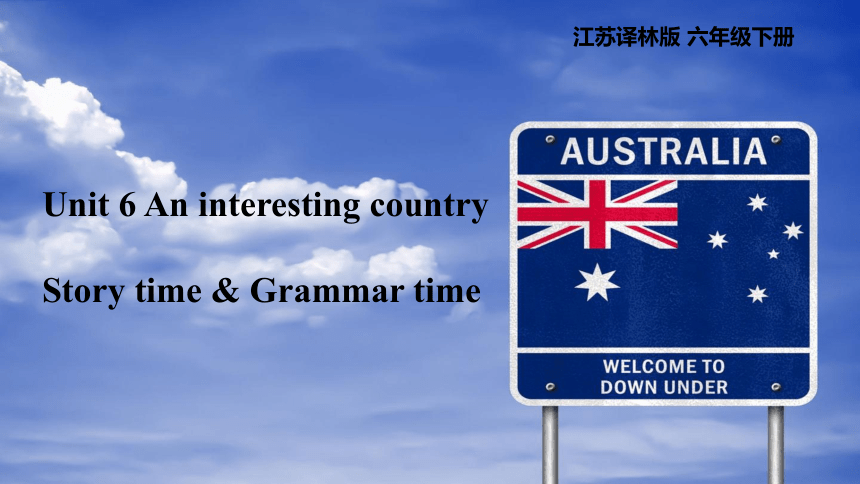
|
|
| 格式 | pptx | ||
| 文件大小 | 9.7MB | ||
| 资源类型 | 试卷 | ||
| 版本资源 | 牛津译林版 | ||
| 科目 | 英语 | ||
| 更新时间 | 2024-04-12 09:26:01 | ||
图片预览

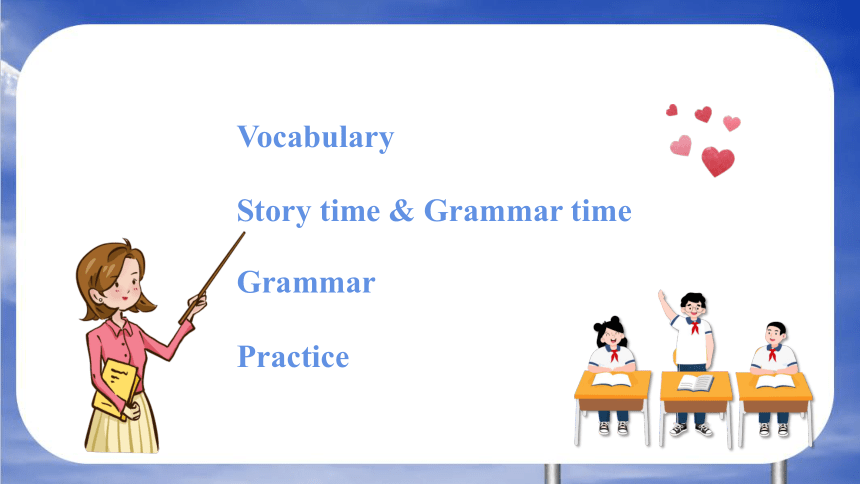
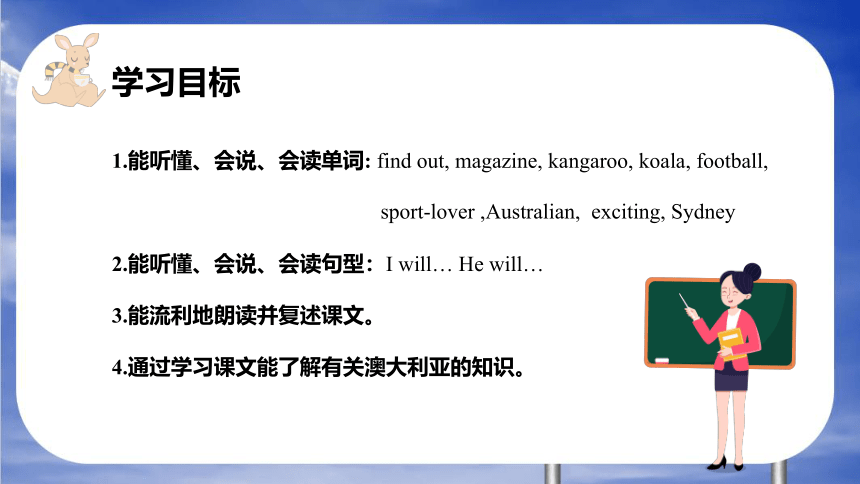
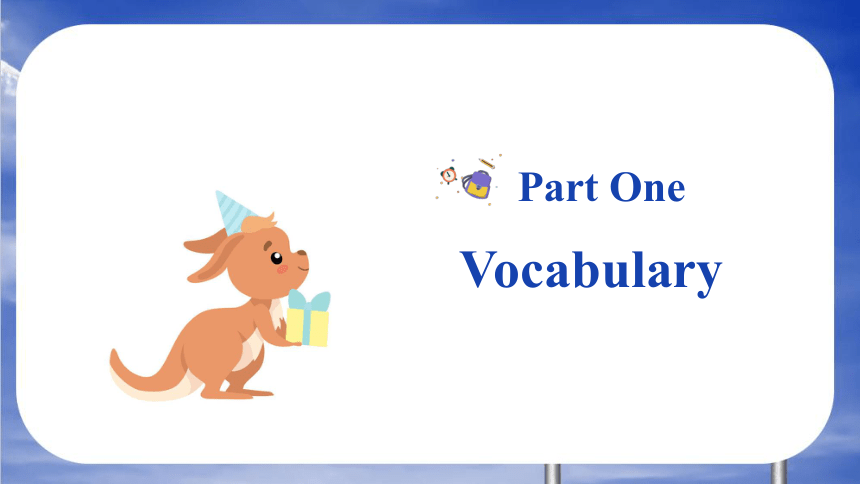
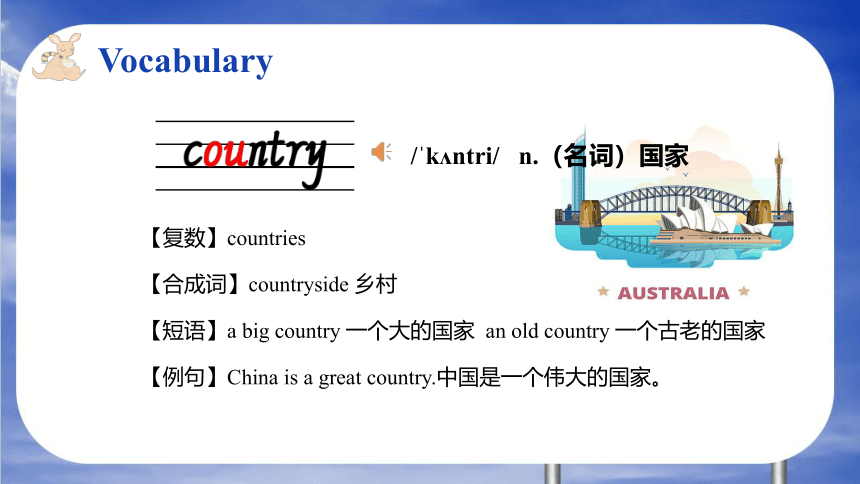
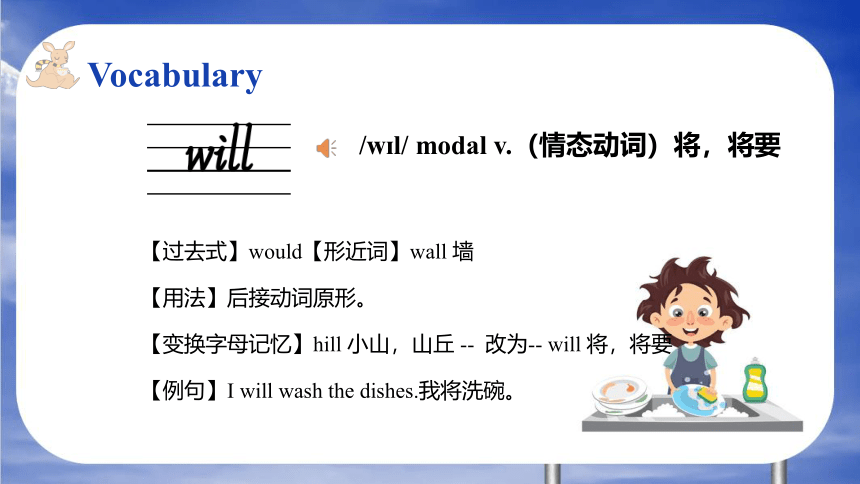

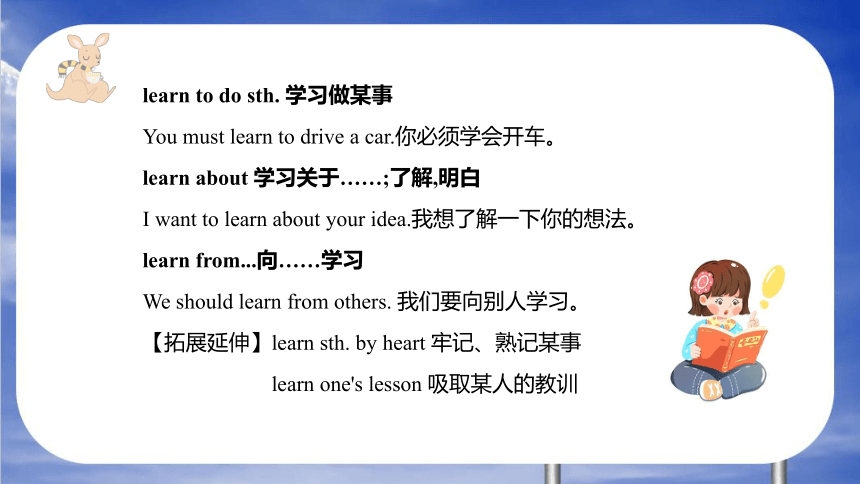

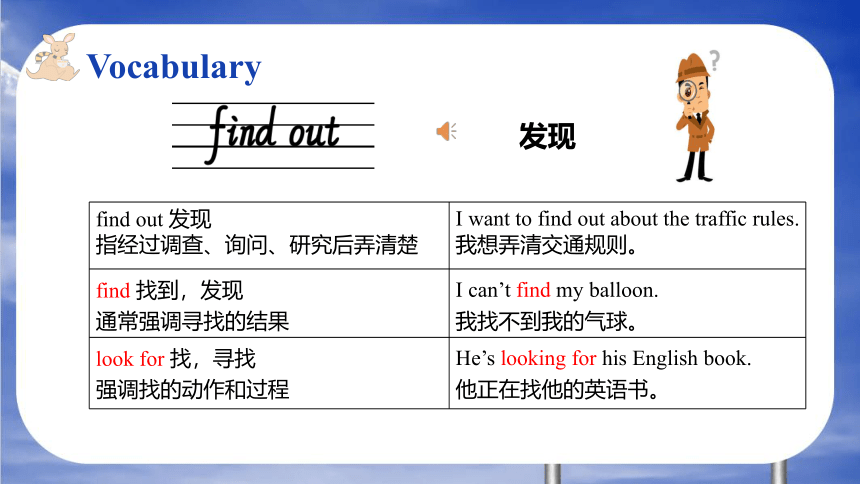
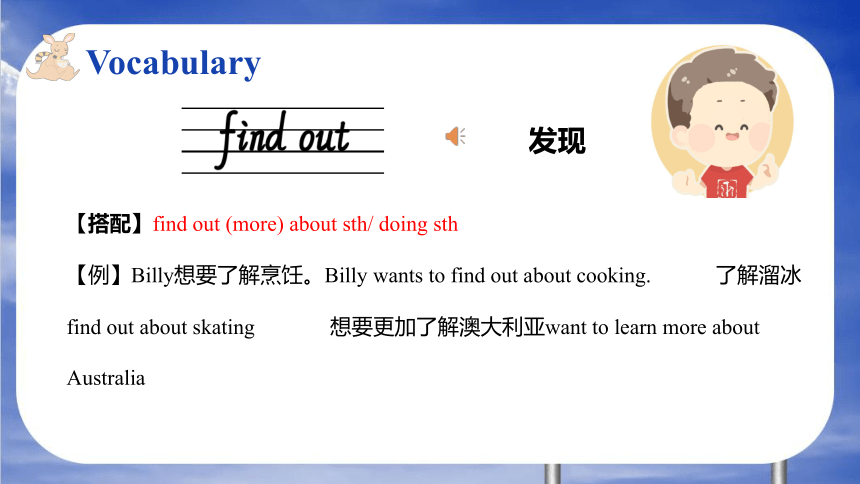

文档简介
(共74张PPT)
Unit 6 An interesting country
Story time & Grammar time
江苏译林版 六年级下册
Vocabulary
Story time & Grammar time
Grammar
Practice
行业PPT模板http:///hangye/
学习目标
1.能听懂、会说、会读单词: find out, magazine, kangaroo, koala, football,
sport-lover ,Australian, exciting, Sydney
2.能听懂、会说、会读句型:I will… He will…
3.能流利地朗读并复述课文。
4.通过学习课文能了解有关澳大利亚的知识。
Vocabulary
Part One
Vocabulary
【复数】countries
【合成词】countryside 乡村
【短语】a big country 一个大的国家 an old country 一个古老的国家
【例句】China is a great country.中国是一个伟大的国家。
/ k ntri/ n.(名词)国家
Vocabulary
/w l/ modal v.(情态动词)将,将要
【过去式】would【形近词】wall 墙
【用法】后接动词原形。
【变换字母记忆】hill 小山,山丘 -- 改为-- will 将,将要
【例句】I will wash the dishes.我将洗碗。
Vocabulary
【近义词】study 学习 【对应词】teach 教
【过去式】learned/learnt
【短语】learn from... 向……学习
【例句】I learnt to dance last year.我去年学习了跳舞。
/l n/ v.(动词)学习
learn to do sth. 学习做某事
You must learn to drive a car.你必须学会开车。
learn about 学习关于……;了解,明白
I want to learn about your idea.我想了解一下你的想法。
learn from...向……学习
We should learn from others. 我们要向别人学习。
【拓展延伸】learn sth. by heart 牢记、熟记某事
learn one's lesson 吸取某人的教训
Vocabulary
/ stre li / n.(名词)澳大利亚
【讲解】澳大利亚位于大洋洲,首都是堪培拉(Canberra)。
【例句】He comes from Australia.他来自澳大利亚。
【联想】Australian 澳大利亚(人)的
Vocabulary
发现
find out 发现 指经过调查、询问、研究后弄清楚 I want to find out about the traffic rules.
我想弄清交通规则。
find 找到,发现 通常强调寻找的结果 I can’t find my balloon.
我找不到我的气球。
look for 找,寻找 强调找的动作和过程 He’s looking for his English book.
他正在找他的英语书。
Vocabulary
发现
【搭配】find out (more) about sth/ doing sth
【例】Billy想要了解烹饪。Billy wants to find out about cooking. 了解溜冰find out about skating 想要更加了解澳大利亚want to learn more about Australia
Vocabulary
【复数】magazines
【短语】read magazines 看杂志
【例句】I'll buy some magazines.我将买一些杂志。
【联想】newspaper 报纸
/ m ɡ zi n/ n.(名词)杂志
Vocabulary
【复数】kangaroos
【联想】Australia 澳大利亚
【例句】爱我们的袋鼠 love our kangaroos
There are lot of kangaroos in Australia.
澳大利亚有许多袋鼠。
/ k ɡ ru / n. (名词) 袋鼠
Vocabulary
【复数】koalas
【短语】 a lot of koalas 许多考拉
【讲解】考拉又叫树袋熊,是澳大利亚的国宝。
【例句】Do you like koalas 你喜欢考拉吗?
/k ɑ l / n. (名词) 考拉
Vocabulary
【复数】 sport- lovers
【巧记】sport (体育运动)+ lover (爱好者)
【注意】艺术爱好者 an art-lover
书籍爱好者a book lover
音乐爱好者a music lover = a lover of music
n.(名词)运动爱好者
Vocabulary
【讲解】澳式橄榄球是源自澳大利亚维多利亚州墨尔本地区的球类运动。
【联想】football 足球
【例句】Australian football is very interesting.澳式橄榄球很有趣。
澳式橄榄球
Vocabulary
/ k sa t / adj.(形容词)令人激动的,
令人兴奋的
【短语】an exciting story 一个令人激动的故事
【辨析】exciting 与 excited
exciting意为“令人激动的,令人兴奋的” ,常说明事物
excited意为“激动的,兴奋的”,常说明人的感受
【例句】I was excited to hear the exciting news.
听到这个令人兴奋的消息,我激动不已。
Vocabulary
【讲解】悉尼是澳大利亚最大的城市。
【联想】Sydney Opera House 悉尼歌剧院
【例句】My uncle lives in Sydney.我叔叔住在悉尼。
/ s dni/ n.(澳大利亚城市)悉尼
Vocabulary
/ welk m/ v.欢迎
【第三人称单数形式】welcomes 【过去式】welcomed
【动词- ing形式】welcoming
【巧记】welcome(来)welcome(欢迎)
【例句】They will welcome you at the gate.
他们将在门口欢迎你。
Vocabulary
【复数】visitors 【其他词义】访问者;参观者
【巧记】visit (参观)visitoror
【拓展】visit (动词)游览;拜访;参观
【例句】There are a lot of visitors in Shanghai.上海有许多游客。
/ v z t (r)/ n. 游人,游客
Vocabulary
Story time
Part Two
① The children will learn about Australia next week.
They want to find out about this country before the lessons.
Story time
学习关于...
发现
Story time
Mike: I'll ask my e-friend in Australia. She can send me some photos.
Wang Bing: I'll ask Mr Green. He comes from Australia.
Liu Tao: I'll read about Australia on the Internet.
Yang Ling: I'll go to the library and look for books and magazines about Australia.
给我发一些照片
来自......
在网上阅读关于......
去图书馆
寻找......
She can send me some photos.
用法:send sth to sb. =send sb sth
例:He sends an email to me. = He sends me an email.
他给我发了一封电子邮件。
I’m going to send Mike a letter. = I’m going to send a letter to Mike.
我要寄一封信给迈克。
知识点:
She can send me some photos.
类似:give sth to sb= give sb. sth
show sth to sb = show sb sth
write sth to sb = write sb sth
say sth to sb
tell sth to sb = tell sb about sth
知识点:
2. He comes from Australia.
知识点:come from = be from
例:He is from Australia.
I come from China. = I’m from China. 我来自中国。
知识点:
3. I’ll read about Australia on the Internet.
知识点:read (books) about sth阅读关于……的书
例:Yang Ling will read books about Australia.
杨玲将会阅读关于澳大利亚的书。
read books about sports 阅读关于运动的书
知识点:
Story time
② At home, Liu Tao is reading about Australia.
在家
阅读关于......
Story time
You will find many interesting things in Australia. Do you like animals You will love our kangaroos and koalas. Sport lovers will like Australian Football games because they are very exciting.
You will also like Sydney. It is a beautiful city. Many people visit it every year.
People in Australia welcome e and visit Australia today!
在澳大利亚
因为
欢迎
知识点:
4. People in Australia welcome visitors.
知识点:people in Australia= Australian people
例:中国人Chinese people= people in China
True or false
1. The children will learn about Australia at school.
2. The children want to learn more about Australia.
3. Mike wants to find some photos about Australia.
4. Wang Bing knows a woman from Australia.
5. Liu Tao has an e-friend in Australia.
6. Yang Ling will read books about Australia.
Read and write
Help Liu Tao complete his notes about Australia.
Grammar time
Part Three
Grammar time
I'll = I will we'll = we will he'll = he will
you'll = you will they'll = they will she'll = she will
I’ll send an email to my friend in Australia .
You’ll find many interesting things We’ll learn about Australia next week They’ll find out about this country He’ll ask Mr Green tomorrow She’ll go to the library Grammar time
will 是助动词,意为“将,将要”。可用于各种人称后,无人称和数的变化。
①“will+动词原形”可以用来构成一般将来时,表示将要发生的事情或对未来的预测。
②will 的否定形式是 will not,可以缩写成 won't。
例如:The children won't go to the library tomorrow.
孩子们明天不打算去图书馆。
Grammar time
2. will 和 be going to 的区别:
①be going to表示说话人主观计划或判断将要做的事情。
will多用于客观上将要发生的事情。
②当表示没有经过事先计划和考虑,而是在说话时临时想到或做出决定时,用will。如果经过事先考虑和具体计划,则用 be going to。
③在正式的通知(比如天气预报、新闻、官方消息等)中用 will。
Grammar time
3. find, find out 和 look for 的区别:
find 是及物动词,意为“找到”,强调结果。
例如:They found Bobby in his bedroom.他们在博比的卧室找到他。look for 意为“寻找”,表示寻找的过程和动作。
例如:I'm looking for my book.我正在寻找我的书。
find out 意为“弄明白”,表示经过研究、计算和探寻后得出结论。
例如:Mike found out the answer on the Internet.迈克在网上查明了答案。
Grammar time
4. learn 和 study 的区别:(表示学习某学科时两者均可)
learn 侧重学习的成果,获取知识和技能,而 learn about表示“学习关于……(的知识)”。learn from sb 表示“向某人学习”。
study 强调学习的过程,指深入系统地进行学习(不是单纯获得技巧),带有努力和勤奋含义。
Grammar time
5. exciting 和excited 的区别:
exciting意为“令人感到兴奋的”,一般修饰事物;
excited 意为“兴奋的”,一般修饰人。
Grammar time
6. What do you think "
What do you think "意为"你觉得呢 ”用来询问对方的观点或看法。当询问对具体的某人或某事的看法时,通常在 think 后加 of 或 about。
例如:—What do you think of the film 你觉得这部电影怎么样
—Amazing!太让人惊叹了!
Grammar time
The children will learn about Australia next week.
孩子们将在下个星期学习有关澳大利亚的知识。
(1)本句为含有will的一般将来时的肯定句,
句型结构为“主语十will十动词原形十其他”,表示某人将要做某事。
Grammar time
The children will learn about Australia next week.
孩子们将在下个星期学习有关澳大利亚的知识。
(2)learn意为“学习”,learn about在本句中译为“学习有关…(的知识)”。
(3)next week意为“下个星期”,注意,由next构成的时间短语前通常不加冠词,且这些时间短语常用于一般将来时态的句子中。
Grammar time
【例句】
(l)Liu Tao will learn about this city on the Internet.
刘涛将在互联网上学习有关这个城市的知识。
(2)There is going to be a singing contest in our school next Thursday.
我们学校在下个星期四将有一个唱歌比赛。
Grammar time
根据中文提示完成句子。(1)下个月他将要飞往北京。He will Beijing .(2)我们想从老师那里学习有关地球的知识。We want to the Earth from the teacher.
Grammar time
They want to find out about this country before the lessons.
他们想要在课前了解有关这个国家的情况。
【解析】(1)find out意为“发现”,强调通过思考、询问、查阅等弄清楚或查明白一件事,后面所接的宾语通常是事情、情况等。
(2)本句中的before为介词,意为“在…之前”。
Grammar time
【例句】
(l)I can find out what time the meeting starts.
我能查清楚会议什么时候开始。
(2)The young woman lived there by herself before she got married.
这位年轻的女士在结婚前独自住在那里。
Grammar time
【知识拓展】辩析before和in front of
before表示时间上的前后关系,其反义词为after;而in front of译为“在前面”,它表示方位上的前后关系,其反义词为behind。例如:
(1)You should wash your hands before you handle food. 拿食物前你应该洗手。
(2)The policeman parked the police car in front of the house.
警察将警车停在了那栋房子前。
Grammar time
(1)单项选择。( )The window is broken. We should who did it. A.find B.look for C.find out(2)选词填空。My friend arrived (before/in front of) me, so he sat (before/in front of) me.
Grammar time
She can send me some photos.她可以给我发一些照片。
【解析】本句中的动词send译为“发送”,send sb sth相当于send sth to sb,意为“给某人发送某物”,但当sb和sth均为代词时,只能使用send sth to sb这一结构。【例句】He sent me an email last night,.-He sent an email to me last night.
他昨夜给我发了一封电子邮件。
Grammar time
【练习】按要求完成句子。I am going to send you a Christmas card next week.(改为同义句) I am going to a Christmas card next week.
Grammar time
He comes from Australia.他来自澳大利亚。
【解析】come from意为“来自”,其同义短语为be from。
【例句】--Where does Amy come from = Where is Amy from
埃米来自哪里?
--She comes from the UK. = She is from the UK.她来自英国。
Grammar time
Sport-lovers will like Australian football games because they are very exciting.
运动爱好者们将会喜欢澳式橄榄球比赛,因为它们非常令人兴奋。
【解析】exciting为形容词,意为“令人激动的,令人兴奋的”,常用来修饰事物。excited也是形容词,意为“激动的;兴奋的”,其主语通常为人或拟人化的物。
【例句】The kids are so excited about the exciting show.isye
孩子们对这场激动人心的演出感到如此兴奋。
Sentences
Part Four
Words
country 国家 will 将,将要
learn 学习 find out 发现
magazine 杂志 kangaroo 袋鼠
koala 考拉 sport-lover 运动爱好者
Australian football 澳式橄榄球 Sydney (澳大利亚城市)悉尼
exciting 令人激动的,令人兴奋的 welcome 欢迎
visitor 游人,游客 for example 例如
a kangaroo 一头袋鼠
a koala 一头考拉(树袋熊)
Australian Football 澳式橄榄球
Sydney 悉尼
Sentences
重点词组1. learn about学习有关…… 2. wait and see等等看3. find out找出,发现,查明 4. before the lessons在这些课前5. ask my e-friend询问我的网友 6. in Australia在澳大利亚7. come from来自 8. look for寻找 9. on the Internet在网上 10. at home在家
重点词组
11. many interesting things许多有趣的事 12. like animals喜欢动物
13. sport lovers体育运动爱好者 14. Australian Football澳式橄榄球
15. very exciting非常令人激动 16. a beautiful city一个美丽城市
17. many people许多人 18. every year每年
19. welcome visitors欢迎参观者 20. read books about读有关……的书
1. The children will learn about Australia next week.
孩子们下周要学习有关澳大利亚的情况。
2. I’ll ask my e-friend in Australia. 我要询问在澳大利亚的网友。
3. I’ll ask Mr Green. He comes from Australia. 我要询问格林先生。他来自澳大利亚。
4. I’ll read about Australia on the Internet. 我要在网上阅读有关澳大利亚的知识。
Sentences
5. I’ll go to the library and look for books and magazines about Australia.
我要去图书馆查阅有关澳大利亚的书籍杂志。
6. You will find many interesting things in Australia.
在澳大利亚,你会找到许多有趣的事情。
7. Sport lovers will like Australian Football games because they are very exciting.
体育爱好者会喜欢澳式橄榄球赛因为它们实在是令人兴奋的比赛。
Sentences
①The children will learn about Australia next week. They want to find out about this country before the lessons.
孩子们将在下周学习关于澳大利亚的内容。他们想要在课前弄清这个国家的情况。
Mike: I'll ask my e-friend in Australia. She can send me some photos.
迈克:我将问我在澳大利亚的网友。她可以发给我一些照片。
Sentences
Wang Bing: I'll ask Mr Green. He comes from Australia.
王兵:我将问格林先生。他来自澳大利亚。
Liu Tao: I'll read about Australia on the Internet.
刘涛:我将在网上阅读关于澳大利亚的信息。
Yang Ling: I'll go to the library and look for books and magazines about Australia.
杨玲:我将去图书馆寻找关于澳大利亚的书和杂志。
Sentences
②At home, Liu Tao is reading about Australia. 在家里,刘涛正在阅读关于澳大利亚的信息。
You will find many interesting things in Australia. 在澳大利亚你将发现很多有趣的事物。
Do you like animals You will love our kangaroos and koalas. Sport--lovers will like Australian football games because they are very exciting.
你喜欢动物吗?你将爱上我们的袋鼠和考拉。运动爱好者将会喜欢上澳式橄榄球比赛,因为比赛十分激动人心。
Sentences
You will also like Sydney. It is a beautiful city. Many people visit it every year.
你也将喜欢悉尼。它是一座美丽的城市。每年许多人游览它。
People in Australia welcome e and visit Australia today!
澳大利亚的人们欢迎游客。今天就来游览澳大利亚吧!
Sentences
Practice
Part Five
选出划线部分不同音的选项。( ) 1. A. hair B. bear C. air D. here( ) 2. A. chair B. near C. hear D. here( ) 3. A. there B. their C. fair D. ear( ) 4. A. visit B. find C. animal D. interesting( ) 5. A. country B. about C. our D. now
英汉互译
1. 一个有趣的国家 _______________ 2. 学习关于……________________
3. 找出,弄明白__________________4. 给我发一些照片___________________
5. 找有关……的书 ______________6. 在网上 ___________________
7. sports lover ___________________8. people in Australia___________________
9. welcome visitors_________________10. fresh air___________
用所给词的适当形式填空1. I _________(want) _________ (write) a letter to Peter.2. They will _________ (go) to the library.3. Many people_________ (visit) it every year.4. You_________ (see) the Great Wall in China next week.5. Reading is very _________ (interest).6. How about _________(go) jogging in the park after school today 7. The boy _________(be) from Canada. His friend _________(come) from the UK.8. The _________(potato) are on the ground.
单项选择( ) 1. The children______ learn about Chinese culture next week. A. will to B. will C. is going to be( ) 2. —______ did you know about the UK —I asked my e-friend. A. When B. What C. How( ) 3. A lot of ______ come to China every year. A. visitor B. visit C. visitors
( ) 4. —There are so many ______ in our school. —Yes, they are cool. A. Australia B. Australian C. Australians ( ) 5. My e-friend will ______me some photos______ Sydney. A. sends, about B. send, about C. send, to ( ) 6. —Where do you usually chat______ Ben —We chant______ the Internet. A. to; on B. with; on C. with; in
( ) 7. ______ is the capital(首都)of Australia. A. Sydney B. Canberra C. Melbourne( ) 8. People ______ Australian football games because they are_______. A. loves; excitedly B. love; exciting C. love; excited( ) 9. The weather is sometimes ______in the UK A. rain B. rains C. rainy
根据句意与提示,选择正确的词填空
1. They want __________ (learn) about Australia before class.
2. Nancy is going to learn about_________(swim).
3. _________ (Australian) is an interesting country.
4. My e-friend usually _________(send) me e-mails.
根据要求完成句子,每空一词1. We are going to buy some kites in the supermarket. (改为同义句) We ________ buy some kites in the supermarket 2. He’ll go to the supermarket tomorrow. (对划线部分提问) ________ __________he do tomorrow 3. There are some interesting places in the UK. (改成一般疑问句) ________ ________ ________ interesting places in the UK
Thank you!
江苏译林版 六年级下册
Unit 6 An interesting country
Story time & Grammar time
江苏译林版 六年级下册
Vocabulary
Story time & Grammar time
Grammar
Practice
行业PPT模板http:///hangye/
学习目标
1.能听懂、会说、会读单词: find out, magazine, kangaroo, koala, football,
sport-lover ,Australian, exciting, Sydney
2.能听懂、会说、会读句型:I will… He will…
3.能流利地朗读并复述课文。
4.通过学习课文能了解有关澳大利亚的知识。
Vocabulary
Part One
Vocabulary
【复数】countries
【合成词】countryside 乡村
【短语】a big country 一个大的国家 an old country 一个古老的国家
【例句】China is a great country.中国是一个伟大的国家。
/ k ntri/ n.(名词)国家
Vocabulary
/w l/ modal v.(情态动词)将,将要
【过去式】would【形近词】wall 墙
【用法】后接动词原形。
【变换字母记忆】hill 小山,山丘 -- 改为-- will 将,将要
【例句】I will wash the dishes.我将洗碗。
Vocabulary
【近义词】study 学习 【对应词】teach 教
【过去式】learned/learnt
【短语】learn from... 向……学习
【例句】I learnt to dance last year.我去年学习了跳舞。
/l n/ v.(动词)学习
learn to do sth. 学习做某事
You must learn to drive a car.你必须学会开车。
learn about 学习关于……;了解,明白
I want to learn about your idea.我想了解一下你的想法。
learn from...向……学习
We should learn from others. 我们要向别人学习。
【拓展延伸】learn sth. by heart 牢记、熟记某事
learn one's lesson 吸取某人的教训
Vocabulary
/ stre li / n.(名词)澳大利亚
【讲解】澳大利亚位于大洋洲,首都是堪培拉(Canberra)。
【例句】He comes from Australia.他来自澳大利亚。
【联想】Australian 澳大利亚(人)的
Vocabulary
发现
find out 发现 指经过调查、询问、研究后弄清楚 I want to find out about the traffic rules.
我想弄清交通规则。
find 找到,发现 通常强调寻找的结果 I can’t find my balloon.
我找不到我的气球。
look for 找,寻找 强调找的动作和过程 He’s looking for his English book.
他正在找他的英语书。
Vocabulary
发现
【搭配】find out (more) about sth/ doing sth
【例】Billy想要了解烹饪。Billy wants to find out about cooking. 了解溜冰find out about skating 想要更加了解澳大利亚want to learn more about Australia
Vocabulary
【复数】magazines
【短语】read magazines 看杂志
【例句】I'll buy some magazines.我将买一些杂志。
【联想】newspaper 报纸
/ m ɡ zi n/ n.(名词)杂志
Vocabulary
【复数】kangaroos
【联想】Australia 澳大利亚
【例句】爱我们的袋鼠 love our kangaroos
There are lot of kangaroos in Australia.
澳大利亚有许多袋鼠。
/ k ɡ ru / n. (名词) 袋鼠
Vocabulary
【复数】koalas
【短语】 a lot of koalas 许多考拉
【讲解】考拉又叫树袋熊,是澳大利亚的国宝。
【例句】Do you like koalas 你喜欢考拉吗?
/k ɑ l / n. (名词) 考拉
Vocabulary
【复数】 sport- lovers
【巧记】sport (体育运动)+ lover (爱好者)
【注意】艺术爱好者 an art-lover
书籍爱好者a book lover
音乐爱好者a music lover = a lover of music
n.(名词)运动爱好者
Vocabulary
【讲解】澳式橄榄球是源自澳大利亚维多利亚州墨尔本地区的球类运动。
【联想】football 足球
【例句】Australian football is very interesting.澳式橄榄球很有趣。
澳式橄榄球
Vocabulary
/ k sa t / adj.(形容词)令人激动的,
令人兴奋的
【短语】an exciting story 一个令人激动的故事
【辨析】exciting 与 excited
exciting意为“令人激动的,令人兴奋的” ,常说明事物
excited意为“激动的,兴奋的”,常说明人的感受
【例句】I was excited to hear the exciting news.
听到这个令人兴奋的消息,我激动不已。
Vocabulary
【讲解】悉尼是澳大利亚最大的城市。
【联想】Sydney Opera House 悉尼歌剧院
【例句】My uncle lives in Sydney.我叔叔住在悉尼。
/ s dni/ n.(澳大利亚城市)悉尼
Vocabulary
/ welk m/ v.欢迎
【第三人称单数形式】welcomes 【过去式】welcomed
【动词- ing形式】welcoming
【巧记】welcome(来)welcome(欢迎)
【例句】They will welcome you at the gate.
他们将在门口欢迎你。
Vocabulary
【复数】visitors 【其他词义】访问者;参观者
【巧记】visit (参观)visitoror
【拓展】visit (动词)游览;拜访;参观
【例句】There are a lot of visitors in Shanghai.上海有许多游客。
/ v z t (r)/ n. 游人,游客
Vocabulary
Story time
Part Two
① The children will learn about Australia next week.
They want to find out about this country before the lessons.
Story time
学习关于...
发现
Story time
Mike: I'll ask my e-friend in Australia. She can send me some photos.
Wang Bing: I'll ask Mr Green. He comes from Australia.
Liu Tao: I'll read about Australia on the Internet.
Yang Ling: I'll go to the library and look for books and magazines about Australia.
给我发一些照片
来自......
在网上阅读关于......
去图书馆
寻找......
She can send me some photos.
用法:send sth to sb. =send sb sth
例:He sends an email to me. = He sends me an email.
他给我发了一封电子邮件。
I’m going to send Mike a letter. = I’m going to send a letter to Mike.
我要寄一封信给迈克。
知识点:
She can send me some photos.
类似:give sth to sb= give sb. sth
show sth to sb = show sb sth
write sth to sb = write sb sth
say sth to sb
tell sth to sb = tell sb about sth
知识点:
2. He comes from Australia.
知识点:come from = be from
例:He is from Australia.
I come from China. = I’m from China. 我来自中国。
知识点:
3. I’ll read about Australia on the Internet.
知识点:read (books) about sth阅读关于……的书
例:Yang Ling will read books about Australia.
杨玲将会阅读关于澳大利亚的书。
read books about sports 阅读关于运动的书
知识点:
Story time
② At home, Liu Tao is reading about Australia.
在家
阅读关于......
Story time
You will find many interesting things in Australia. Do you like animals You will love our kangaroos and koalas. Sport lovers will like Australian Football games because they are very exciting.
You will also like Sydney. It is a beautiful city. Many people visit it every year.
People in Australia welcome e and visit Australia today!
在澳大利亚
因为
欢迎
知识点:
4. People in Australia welcome visitors.
知识点:people in Australia= Australian people
例:中国人Chinese people= people in China
True or false
1. The children will learn about Australia at school.
2. The children want to learn more about Australia.
3. Mike wants to find some photos about Australia.
4. Wang Bing knows a woman from Australia.
5. Liu Tao has an e-friend in Australia.
6. Yang Ling will read books about Australia.
Read and write
Help Liu Tao complete his notes about Australia.
Grammar time
Part Three
Grammar time
I'll = I will we'll = we will he'll = he will
you'll = you will they'll = they will she'll = she will
I’ll send an email to my friend in Australia .
You’ll find many interesting things We’ll learn about Australia next week They’ll find out about this country He’ll ask Mr Green tomorrow She’ll go to the library Grammar time
will 是助动词,意为“将,将要”。可用于各种人称后,无人称和数的变化。
①“will+动词原形”可以用来构成一般将来时,表示将要发生的事情或对未来的预测。
②will 的否定形式是 will not,可以缩写成 won't。
例如:The children won't go to the library tomorrow.
孩子们明天不打算去图书馆。
Grammar time
2. will 和 be going to 的区别:
①be going to表示说话人主观计划或判断将要做的事情。
will多用于客观上将要发生的事情。
②当表示没有经过事先计划和考虑,而是在说话时临时想到或做出决定时,用will。如果经过事先考虑和具体计划,则用 be going to。
③在正式的通知(比如天气预报、新闻、官方消息等)中用 will。
Grammar time
3. find, find out 和 look for 的区别:
find 是及物动词,意为“找到”,强调结果。
例如:They found Bobby in his bedroom.他们在博比的卧室找到他。look for 意为“寻找”,表示寻找的过程和动作。
例如:I'm looking for my book.我正在寻找我的书。
find out 意为“弄明白”,表示经过研究、计算和探寻后得出结论。
例如:Mike found out the answer on the Internet.迈克在网上查明了答案。
Grammar time
4. learn 和 study 的区别:(表示学习某学科时两者均可)
learn 侧重学习的成果,获取知识和技能,而 learn about表示“学习关于……(的知识)”。learn from sb 表示“向某人学习”。
study 强调学习的过程,指深入系统地进行学习(不是单纯获得技巧),带有努力和勤奋含义。
Grammar time
5. exciting 和excited 的区别:
exciting意为“令人感到兴奋的”,一般修饰事物;
excited 意为“兴奋的”,一般修饰人。
Grammar time
6. What do you think "
What do you think "意为"你觉得呢 ”用来询问对方的观点或看法。当询问对具体的某人或某事的看法时,通常在 think 后加 of 或 about。
例如:—What do you think of the film 你觉得这部电影怎么样
—Amazing!太让人惊叹了!
Grammar time
The children will learn about Australia next week.
孩子们将在下个星期学习有关澳大利亚的知识。
(1)本句为含有will的一般将来时的肯定句,
句型结构为“主语十will十动词原形十其他”,表示某人将要做某事。
Grammar time
The children will learn about Australia next week.
孩子们将在下个星期学习有关澳大利亚的知识。
(2)learn意为“学习”,learn about在本句中译为“学习有关…(的知识)”。
(3)next week意为“下个星期”,注意,由next构成的时间短语前通常不加冠词,且这些时间短语常用于一般将来时态的句子中。
Grammar time
【例句】
(l)Liu Tao will learn about this city on the Internet.
刘涛将在互联网上学习有关这个城市的知识。
(2)There is going to be a singing contest in our school next Thursday.
我们学校在下个星期四将有一个唱歌比赛。
Grammar time
根据中文提示完成句子。(1)下个月他将要飞往北京。He will Beijing .(2)我们想从老师那里学习有关地球的知识。We want to the Earth from the teacher.
Grammar time
They want to find out about this country before the lessons.
他们想要在课前了解有关这个国家的情况。
【解析】(1)find out意为“发现”,强调通过思考、询问、查阅等弄清楚或查明白一件事,后面所接的宾语通常是事情、情况等。
(2)本句中的before为介词,意为“在…之前”。
Grammar time
【例句】
(l)I can find out what time the meeting starts.
我能查清楚会议什么时候开始。
(2)The young woman lived there by herself before she got married.
这位年轻的女士在结婚前独自住在那里。
Grammar time
【知识拓展】辩析before和in front of
before表示时间上的前后关系,其反义词为after;而in front of译为“在前面”,它表示方位上的前后关系,其反义词为behind。例如:
(1)You should wash your hands before you handle food. 拿食物前你应该洗手。
(2)The policeman parked the police car in front of the house.
警察将警车停在了那栋房子前。
Grammar time
(1)单项选择。( )The window is broken. We should who did it. A.find B.look for C.find out(2)选词填空。My friend arrived (before/in front of) me, so he sat (before/in front of) me.
Grammar time
She can send me some photos.她可以给我发一些照片。
【解析】本句中的动词send译为“发送”,send sb sth相当于send sth to sb,意为“给某人发送某物”,但当sb和sth均为代词时,只能使用send sth to sb这一结构。【例句】He sent me an email last night,.-He sent an email to me last night.
他昨夜给我发了一封电子邮件。
Grammar time
【练习】按要求完成句子。I am going to send you a Christmas card next week.(改为同义句) I am going to a Christmas card next week.
Grammar time
He comes from Australia.他来自澳大利亚。
【解析】come from意为“来自”,其同义短语为be from。
【例句】--Where does Amy come from = Where is Amy from
埃米来自哪里?
--She comes from the UK. = She is from the UK.她来自英国。
Grammar time
Sport-lovers will like Australian football games because they are very exciting.
运动爱好者们将会喜欢澳式橄榄球比赛,因为它们非常令人兴奋。
【解析】exciting为形容词,意为“令人激动的,令人兴奋的”,常用来修饰事物。excited也是形容词,意为“激动的;兴奋的”,其主语通常为人或拟人化的物。
【例句】The kids are so excited about the exciting show.isye
孩子们对这场激动人心的演出感到如此兴奋。
Sentences
Part Four
Words
country 国家 will 将,将要
learn 学习 find out 发现
magazine 杂志 kangaroo 袋鼠
koala 考拉 sport-lover 运动爱好者
Australian football 澳式橄榄球 Sydney (澳大利亚城市)悉尼
exciting 令人激动的,令人兴奋的 welcome 欢迎
visitor 游人,游客 for example 例如
a kangaroo 一头袋鼠
a koala 一头考拉(树袋熊)
Australian Football 澳式橄榄球
Sydney 悉尼
Sentences
重点词组1. learn about学习有关…… 2. wait and see等等看3. find out找出,发现,查明 4. before the lessons在这些课前5. ask my e-friend询问我的网友 6. in Australia在澳大利亚7. come from来自 8. look for寻找 9. on the Internet在网上 10. at home在家
重点词组
11. many interesting things许多有趣的事 12. like animals喜欢动物
13. sport lovers体育运动爱好者 14. Australian Football澳式橄榄球
15. very exciting非常令人激动 16. a beautiful city一个美丽城市
17. many people许多人 18. every year每年
19. welcome visitors欢迎参观者 20. read books about读有关……的书
1. The children will learn about Australia next week.
孩子们下周要学习有关澳大利亚的情况。
2. I’ll ask my e-friend in Australia. 我要询问在澳大利亚的网友。
3. I’ll ask Mr Green. He comes from Australia. 我要询问格林先生。他来自澳大利亚。
4. I’ll read about Australia on the Internet. 我要在网上阅读有关澳大利亚的知识。
Sentences
5. I’ll go to the library and look for books and magazines about Australia.
我要去图书馆查阅有关澳大利亚的书籍杂志。
6. You will find many interesting things in Australia.
在澳大利亚,你会找到许多有趣的事情。
7. Sport lovers will like Australian Football games because they are very exciting.
体育爱好者会喜欢澳式橄榄球赛因为它们实在是令人兴奋的比赛。
Sentences
①The children will learn about Australia next week. They want to find out about this country before the lessons.
孩子们将在下周学习关于澳大利亚的内容。他们想要在课前弄清这个国家的情况。
Mike: I'll ask my e-friend in Australia. She can send me some photos.
迈克:我将问我在澳大利亚的网友。她可以发给我一些照片。
Sentences
Wang Bing: I'll ask Mr Green. He comes from Australia.
王兵:我将问格林先生。他来自澳大利亚。
Liu Tao: I'll read about Australia on the Internet.
刘涛:我将在网上阅读关于澳大利亚的信息。
Yang Ling: I'll go to the library and look for books and magazines about Australia.
杨玲:我将去图书馆寻找关于澳大利亚的书和杂志。
Sentences
②At home, Liu Tao is reading about Australia. 在家里,刘涛正在阅读关于澳大利亚的信息。
You will find many interesting things in Australia. 在澳大利亚你将发现很多有趣的事物。
Do you like animals You will love our kangaroos and koalas. Sport--lovers will like Australian football games because they are very exciting.
你喜欢动物吗?你将爱上我们的袋鼠和考拉。运动爱好者将会喜欢上澳式橄榄球比赛,因为比赛十分激动人心。
Sentences
You will also like Sydney. It is a beautiful city. Many people visit it every year.
你也将喜欢悉尼。它是一座美丽的城市。每年许多人游览它。
People in Australia welcome e and visit Australia today!
澳大利亚的人们欢迎游客。今天就来游览澳大利亚吧!
Sentences
Practice
Part Five
选出划线部分不同音的选项。( ) 1. A. hair B. bear C. air D. here( ) 2. A. chair B. near C. hear D. here( ) 3. A. there B. their C. fair D. ear( ) 4. A. visit B. find C. animal D. interesting( ) 5. A. country B. about C. our D. now
英汉互译
1. 一个有趣的国家 _______________ 2. 学习关于……________________
3. 找出,弄明白__________________4. 给我发一些照片___________________
5. 找有关……的书 ______________6. 在网上 ___________________
7. sports lover ___________________8. people in Australia___________________
9. welcome visitors_________________10. fresh air___________
用所给词的适当形式填空1. I _________(want) _________ (write) a letter to Peter.2. They will _________ (go) to the library.3. Many people_________ (visit) it every year.4. You_________ (see) the Great Wall in China next week.5. Reading is very _________ (interest).6. How about _________(go) jogging in the park after school today 7. The boy _________(be) from Canada. His friend _________(come) from the UK.8. The _________(potato) are on the ground.
单项选择( ) 1. The children______ learn about Chinese culture next week. A. will to B. will C. is going to be( ) 2. —______ did you know about the UK —I asked my e-friend. A. When B. What C. How( ) 3. A lot of ______ come to China every year. A. visitor B. visit C. visitors
( ) 4. —There are so many ______ in our school. —Yes, they are cool. A. Australia B. Australian C. Australians ( ) 5. My e-friend will ______me some photos______ Sydney. A. sends, about B. send, about C. send, to ( ) 6. —Where do you usually chat______ Ben —We chant______ the Internet. A. to; on B. with; on C. with; in
( ) 7. ______ is the capital(首都)of Australia. A. Sydney B. Canberra C. Melbourne( ) 8. People ______ Australian football games because they are_______. A. loves; excitedly B. love; exciting C. love; excited( ) 9. The weather is sometimes ______in the UK A. rain B. rains C. rainy
根据句意与提示,选择正确的词填空
1. They want __________ (learn) about Australia before class.
2. Nancy is going to learn about_________(swim).
3. _________ (Australian) is an interesting country.
4. My e-friend usually _________(send) me e-mails.
根据要求完成句子,每空一词1. We are going to buy some kites in the supermarket. (改为同义句) We ________ buy some kites in the supermarket 2. He’ll go to the supermarket tomorrow. (对划线部分提问) ________ __________he do tomorrow 3. There are some interesting places in the UK. (改成一般疑问句) ________ ________ ________ interesting places in the UK
Thank you!
江苏译林版 六年级下册
